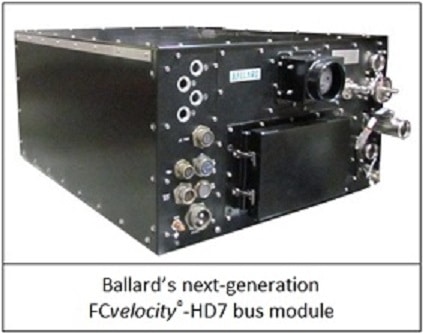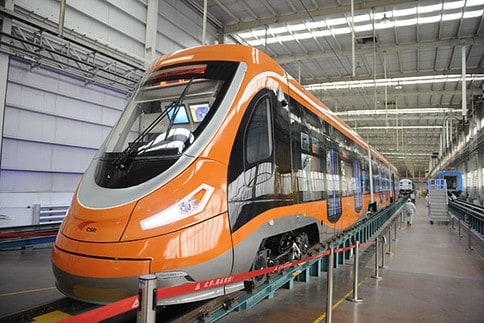
This is part three of a three part article called Tech Sparks, which examines sub-sectors of Canadian technology that could spark a more general revival. For Parts One and Two, please find the links at the bottom of the page.
It’s a natural, right? Left leaning British Columbia becomes a cleantech mecca. Investors and innovators drink soy lattes and celebrate their successes by dancing barefoot in Stanley Park. But that storyline, while more plausible here than most other places in the country, has had its share of false starts.
One such misstep began in 1993, the year that Vancouver’s Ballard Power (TSX:BLD) IPO’d at $6 a share. The company had just demonstrated the world’s first zero-emission fuel-cell bus. The promise of the company’s technology seemed both limitless and inevitable and it was reflected in its share price. By 1997 Ballard had soared to $82, as the company received investments from Daimler Chrysler and Ford. Every major car company was developing fuel cell vehicles, from Honda’s FCX to GM’s Sequel.
Little by little, however, the big picture began to change. Hydrogen was infamous for being wildly expensive, not just the production of the fuel cells themselves, but in the infrastructure that would be required to make their use practical for drivers. The industry’s lack of ability to pull down costs became “…almost like a running joke” according to Mike Omotoso, powertrain analyst at automotive research firm J.D. Power and Associates. “Every 10 years, everybody says it’s 10 years away,”
The inability of fuel cell developers to reduce costs, coupled with advances in battery technology began to sway momentum to electric vehicles, and momentum was gathering steam. By 2005, shares of Ballard had fallen south of $4. Ford had begun pulling resources from hydrogen, to concentrate on electrics. CEO Fritz Henderson said the Volt ” will likely cost around $40,000 while a hydrogen vehicle would cost around $400,000.” There are now estimated to be less than two hundred hydrogen fuel cell cars operating in the United States.
But Despite Ballard’s inability to hit a home run in the auto-sector, some are feeling better than ever about British Columbia’s prospects of becoming a cleantech capital. Brent Holliday, a partner at Vancouver advisory firm Capital West Partners says “Few cleantech companies have sold or had big IPOs in the past decade.” Holliday, however, says he see this turning around soon. The reason, he says, is that “Even though Ballard and the fuel cell industry stumbled, the attraction of top talent from around the world has allowed related companies to thrive. Anytime you attract top talent to a region, you start to form clusters of companies around their field of work. The number one reason that engineers want to work in a region is to do interesting work. If BC is known for certain exciting areas of cleantech innovation, then the virtuous cycle of attracting more talent keeps going.”
Another reason for optimism, some would argue, is that there’s a new cleantech alpha in Vancouver. Westport Innovations grew out of a research project by Professor Philip Hill at the University of British Columbia’s Mechanical Engineering Department. Hill was developing a concept called high pressure direct injection (HPDI) of natural gas.
In 1994, through UBC’s University-Industry Liaison Office, Hill met current Westport CEO David Demers. In 1995, with HPDI technology as its principal strategic asset, Westport Innovations Inc. was formed. Today the company does nearly $150 million in revenue, has attracted legendary investor George Soros as its largest shareholder, and has created valuable strategic alliances with some of the world’s largest engine and vehicle manufacturers, such as Volvo, Cummins, and Kenworth.
Recent improvement in technologies such as shale fracking and the production of liquefied natural gas from coal bed methane have driven up the supply of natural gas and subsequently sent the price plummeting. Many are now touting the adoption of natural gas as a cleaner “transition fuel” that could bring energy independence to the United States. This makes Westport Innovations, which has already partnered with three of the world’s top four top engine makers, a natural. It’s also made shareholders of the company positively giddy. Westport’s stock has risen to a recent high of more than $25, from barely $5 in late 2008. On the way, the company has doubled its revenue, from $71.5 million to $148 million in fiscal 2011.
According to David Demers “a lot of credit should go to the University of British Columbia”. He notes that several members of the team that originated the UBC project work with Westport today, including Chief Technology Officer Patric Ouellette and Phil Hill himself. Demers, meanwhile, is optimistic that his company is just getting started. He says that if the history of Westport Innovations is a nine inning game, the company is just at the top of the third. One concern is the high cost of living in Vancouver, which Demers says can make some positions difficult to fill. But, he says, these concerns are minor compared to the companies momentum: “We are still growing at a fantastic rate” he notes “We’ve grown from 135 personnel in the last three years to over 625, globally, today.”
It may be too early to conclude that Westport’s success is positively impacting the BC cleantech scene, but a new report from KPMG suggests the company might not have to. The study, Cleantech Report Card for British Columbia, which was conducted in partnership with the BC Cleantech CEO Alliance, says cleantech is one of the province’s fastest growing industries and has the potential to be a “significant economic generator”
KPMG notes that there are now 202 companies in B.C. whose sole focus is the research, development or deployment of clean-technological innovations, and that more than two-thirds of them did not exist a decade ago.
Investors combing the TSX Venture Exchange may have noticed a few new cleantech flare-ups from Vancouver; Naturally Advanced Technologies (TSXV:NAT), which is developing alternative fibres made from flax and hemp has recently partnered with for its Crailar flax fibre product with Hanes and Levi Strauss. And AgriMarine (TSXV:FSH) has gotten worldwide press for its contained fish farms.
But as the KPMG report suggest there is a wave of new companies generating buzz in the Lower Mainland. Newer private companies like General Fusion, which was recently awarded $13.9 million by Sustainable Development Technology Canada to develop its Magnetized Target Fusion, a next-generation approach to producing fusion power, and Nexterra, which develops, manufactures and delivers advanced gasification systems, are generating a lot of buzz, says CapWest’s Holliday.
And then there’s Ballard Power. As it turns out rumours of the death of Vancouver’s original eight-hundred pound cleantech gorilla were greatly exaggerated.. In 2007, with its stock slumping, the company got out of the automotive market The revamped Ballard now concentrates, largely, on providing fuel cell power to things that don’t move, such as its FCgen fuel cell technology for telecommunications backup applications, or for things that move rather slowly, like forklifts. Though the company is still losing money, Ballard’s fiscal 2010 revenue of $65 million was a big step up from the year prior, when it did just $45.7 million.
RELATED: VANCOUVER’S TECH SCENE EMERGES FROM THE DRIZZLE
This is part three of a three-part article called Tech Sparks, for Part One CLICK HERE
____________________________________________________________________________________
____________________________________________________________________________________
Comment
One thought on “Tech Sparks: Could BC become the next Cleantech Mecca?”
Leave a Reply
You must be logged in to post a comment.





 Share
Share Tweet
Tweet Share
Share




This is technology we should be looking at in BC to leverage our aluminum mining industry:
http://nocamels.com/2012/06/new-cleantech-co-to-power-cars-with-aluminum-grains/